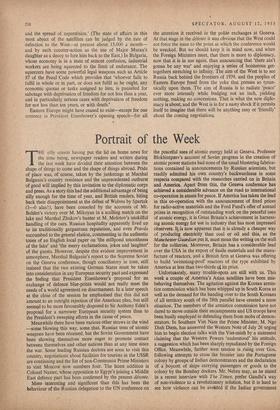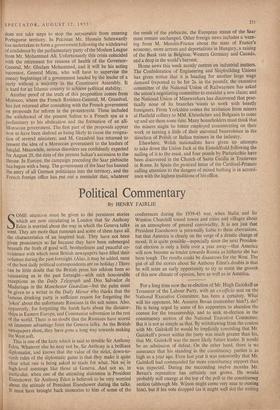Portrait of the Week
THI • silly season having put the lid on home news for the time being, newspaper readers and writers during the last week have divided their attention between the shape of things to come and the shape of things abroad. Pride of place was, of course, taken by the junketings at Marshal Bulganin's country residence and the unprecedented outburst of good will implied by this invitation to the.diplomatic corps and press. As a story this had the additional advantage of being silly enough for the time of year, and British readers, biting back their disappointment at the defeat of Wolves by Spartak (3-0 alas !), have been consoled by the accounts of Mr. Bohlen's victory over M. Mikoyan in a sculling match on the lake and Marshal Zhukov's banter at M.. Molotov's unskilful handling of the oars. Russian hospitality apparently lived up to its traditionally gargantuan reputation, and even Pravda succumbed to the general elation, commenting in the authentic tones of an English local paper on 'the millpond smoothness of the lake' and 'the merry exclamations, jokes and laughter' of the guests. However, despite this evident improvement in atmosphere, Marshal Bulganin's report to the Supreme Soviet on thp Geneva conference, though conciliatory in tone, still insisted that the two existing German States must be taken into consideration in any European security pact and expressed the feeling that President Eisenhower's proposal for an exchange of defence blue-prints would not really meet the needs of a world agreement on disarmament. In a later speech at the close of the session he emphasised that this did not amount to an outright rejection of the American plan, but still seemed to be more favourably disposed to Sir Anthony Eden's proposal for a narrower European security system than to the President's sweeping efforts in the cause of peace.
Meanwhile there have been various other straws in the wind —some blowing this way, some that. Russian tests of atomic weapons have been resumed, but the Soviet Government have been showing themselves more eager to promote contact between themselves and other nations than at any time since the war. Some leading Russian doctors are soon to visit this country, negotiations about facilities for tourists in the USSR are continuing and the list of non-Cominunist Prime Ministers to visit Moscow now numbers four. The latest addition is Colonel Nasser, whose opposition to Egypt's joining a Middle East defence pact has been confirmed by the present détente.
More interesting and significant than this has been the behaviour of the Russian delegation to the UN conference on the peaceful uses of atomic energy held at Geneva. Professor Blokhintpzev's account of Soviet progress in the creation of atomic power stations had none of the usual blustering fabrica- tions contained in announcements by Russian scientists, but readily admitted his own country's backwardness in some respects compared with the researches carried on in Britain and America. Apart from this, the Geneva conference has achieved a considerable advance on the road to international co-operation in atoms for peace. If America has taken the lead in this co-operation with the announcement of fixed prices for radio-active materials and the Ford Fund's offer of annual prizes in recognition of outstanding work on the peaceful uses of atomic energy, it is Great Britain's achievement in harness- ing atomic energy for use in industry that has most impressed observers. It is now apparent that it is already a cheaper way of ptoducing electricity than coal or oil and this, as the Manchester Guardian put it, must mean the writing on the wall for the collieries. Moreover, Britain has a considerable lead over the USA in the export of fissile materials and the manu- facture of reactors, and a British firm at Geneva was offering to build 'swimming-pool' reactors of the type exhibited by America at less than two-thirds o its price.
Unfortunately, many trouble-spots are still with us. This week a couple of America's Asian satellites have been mis- behaving themselves. The agitation against the Korean armis- tice commission which has been whipped up in South Korea as well as the demand for the handing over to the South Koreans of all territory south of the 38th parallel have created a tense situation. The members of the armistice commission have not dared to move outside their encampments and US troops have been busily employed in defending them from mobs of demon- strators. In Southern Viet Nam the Prime Minister, M. Ngo Dinh Diem, has answered the Western Note of July 26 urging him to begin election talks with the Viet-minh by a statement claiming that the Western Powers 'understood' his attitude, a suggestion which has been sharply repudiated by the Foreign Office. Meanwhile, farther west tension is rising over Goa, following attempts to cross the frontier into the Portuguese colony by groups of Indian demonstrators and the declaration of a ,boycott of ships carrying passengers or goods to the colony by the Bombay dockers. Mr. Nehru may, as he stated in a recent interview with The Times, prefer Gandhi's way of non-violence to a revolutionary solution, but it is hard to see how violence can be avoided if the Indian government does not take steps to stop the satyagrahis from entering Portuguese territory. In Pakistan Mr. Hussain Suhrawardy has undertaken to form a government following the withdrawal of confidence by the parliamentary party of the Moslem League from Mr. Mohammed Ali. Unfortunately this crisis coincided with the retirement for reasons of health of the Governor- General, Mr. Ghulam Mohammed, and it will be his acting successor, General Mirza, who will have to supervise the uneasy beginnings of a government headed by the leader of a party without a majority in the Constituent Assembly. It is hard for an Islamic country to achieve political stability.
Another proof of the truth of this proposition comes from Morocco, where the French Resident-General, M. Grandval, has just returned after consulting with the French government on proposals for reform in the protectorate. These included the withdrawal of the present Sultan to a French spa as a preliminary to his abdication and the formation of an all- Moroccan government. The first part of the proposals appear now to have been shelved as being likely to cause the resigna- tion of several ministers; and M. Grandval has returned to present the'idea of a Moroccan government to the leaders of Istiqlal. Meanwhile, serious disorders are confidently expected for August 20, the date of the present Sultan's accession to the throne. In Europe, the campaign preceding the Saar plebiscite has begun with a bang. The government of the Saar has banned the entry of all German politicians into the territory, and the French foreign office has put out a reminder that, whatever the result of the plebiscite, the European status of the Saar must remain unchanged. Other foreign news includes a warn- ing from M. Mendes-France about the state of France's economy, more arrests and deportations in Hungary, a raising of the Bank rate in Belgium, Western Germany and Canada, and a drop in the world's harvest.
Home, news this week mostly centres on industrial matters. The Confederation of Engineering and Shipbuilding Unions has given notice that it is headipg for another large wage demand (reported to be for 2s. in the pound); the executive committee of the National Union of Railwaymen has asked the union's negotiating committee to consider a new claim; and the National Union of Mineworkers has discovered that prac- tically none of its branches wants to work with beastly foreigners. From Yorkshire comes the invitation from miners at Hatfield colliery to MM. Khrushchev and Bulganin to come up and see them some time2Many householders must think that the miners might be better employed concentrating on their work or turning a little of their universal benevolence in the direction of Polish or Italian trainees in the industry.
Elsewhere, Welsh nationalists have given up attempts, to take down the Union Jack at the Eisteddfodd following the nailing of it to the mast, and four panels by Pinturicchio have been discovered in the Church of Santa Cecilia in Trastevere in Rome. In Spain the pastoral letter of the Cardinal-Primate calling attention to the dangers of mixed bathing is in accord- ance with the highest traditions of his office.



































 Previous page
Previous page